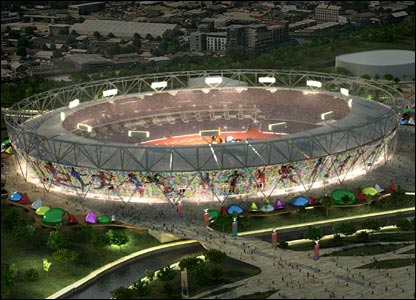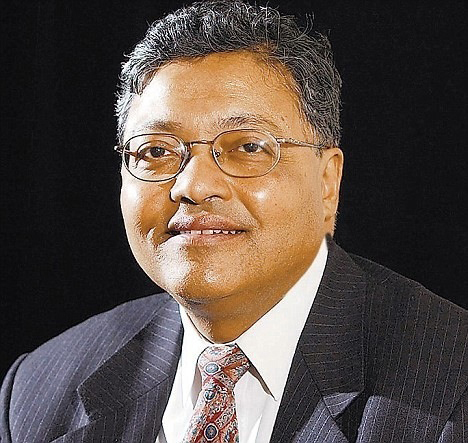The row about the post-Olympic use of the Stratford stadium is the price of unexpected victory. And, if it is not quite like the wages of sin, it is just as painful.
In many ways, the 2012 bid book pledge to retain an athletics track at the Olympic stadium was the sporting equivalent of the Liberal Democrats’ pledge not to raise tuition fees.
They made it in good faith but then they did not expect to be in Government, some of them are clearly still uncomfortable with being in power. And, once inside the tent, they had to renege on the pledge as realities struck. Just as the Liberal Democrats didn’t expect to be in Government, London did not expect to win in Singapore. If, at the end of the day, the promise on the track is broken, it must be seen as one of those hard realities that confront those in power.
Now let me make it clear. I speak not as a sceptic of the Games but as an enthusiast. Indeed, back in 2002, I launched the Daily Telegraph‘s campaign for London to bid. At that time, the rest of the media were sceptical, Ministers were not at all sure and the Treasury very hostile. And, in Singapore in 2005, I was confident that London had run a vastly superior campaign to Paris and could win, indeed I won money on London.
However, the fact is that, when the bid promises were made, many in the British Government just did not think London could win. The Treasury, under Gordon Brown, which had only very reluctantly been persuaded to back the bid, certainly did not. As Ken Livingstone, then London Mayor, has since frankly confessed, when the bid book figures were put together, the Treasury did not really examine them. They saw the bid, as Livingstone puts it, as “Ken and Tessa’s [Jowell, Culture Secretary] little toy.” Treasury officials have since told me that they were convinced that London was not going to win they didn’t bother with the figures.
This explains why the bid book figure of £2.375 billion went up to £9.3 billion 18 months after the bid. Even this higher figure was only for building the infrastructure for the Games. Remember, unlike Paris, London was building from scratch.
The post-Olympic use of the stadium was something else entirely and, from the beginning, football has been Banquo’s ghost in this debate. Richard Caborn, then Sports Minister, tried very hard but failed to make his colleagues understand that, to make the stadium viable, there had to be a football anchor tenant. Initially, there was much optimism that a non football solution could be found, including attracting rugby clubs.
Subsequently a football solution was sought and, until a year ago, the plan was for the stadium to be scaled back to 25,000 seats after the closing ceremony. And the football tenant was to be – wait for it – Leyton Orient.

It seemed logical enough. Brisbane Road, the home of this 130-year old club, London’s second-oldest Football League Club, is one long goal-kick from the Olympic Park.
As Barry Hearn, chairman of Leyton Orient, told me: “We negotiated with the Olympic authorities for three years and would have loved to have been in the Olympic stadium.” At Brisbane Road, Leyton can accommodate 9,000, although at present they average round 5,000. Post-2012, with a 25,000 stadium to fill, Hearn felt this, “would have given us capacity to grow to perhaps 24,000. But they built the wrong stadium. In an athletics stadium, the slope of the seats is different, they go up at a different angle to a football stadium. And then Seb [Coe, chairman of 2012] said, ‘I have given my word that the running track must remain.’ I said, ‘Spend money on a hydraulic system, like at Stade de France where seats come forward during football to cover the track,’ but they did not want to spend the money. A running track kills football. In modern football, proximity to players gives the atmosphere.”
Eventually, a year ago, Hearn broke off talks. Just as he did so, West Ham changed hands, and the new owners, the two Davids, Sullivan and Gold, revived the idea of the Hammers moving there.
Sullivan has never made any secret that moving to the Olympic Stadium was central to his ambition. At the time of the takeover, his ambition was to get West Ham to the Champions League within seven years. Now West Ham’s ambition may be to stay out of the Championship, but the Olympic Stadium is still attractive. It was Sullivan who first started questioning plans to convert the 80,000 stadium into a 25,000 one after the Games. As Sullivan put it to me after the takeover, “It is obscene in the credit crunch to build a stadium and bring three quarters of it down.”
At that stage, he also was insisting that the track had to go. When Lord Coe reiterated that the track would stay, Sullivan said what Daniel Levy, chairman of Tottenham, would echo today: “He [Coe] can have an athletics’ track somewhere else. How many athletics’ tracks does he want? It is a minority sport. The bigger dream is for West Ham fans to have a football stadium.”
Sullivan was sure then he could fill a stadium of 80,000. “We would offer tickets at £5 a go for some matches. We can bring Premier League football back to the people.” It is interesting, given talk of Tottenham changing names if they move, that Karren Brady, the West Ham vice-chairman, suggested a name change. However Sullivan quickly quashed it saying: “There is no possibility of West Ham being called anything other than West Ham United.”
About the time that Sullivan was saying the track should go, Baroness Ford, the chair of the Olympic Park Legacy Company, in evidence to MPs, was insisting that athletics could co-exist with football, “For me, premier athletics must be part of the mix because that was part of the bid commitment.”
Clearly, since then, West Ham has had to bow to the Baroness. But their willingness to accommodate the track shows their great desire to get hold of the Olympic stadium. Why? They see the possibility of harvesting football gold from Stratford. On offer is a stadium proving excellent transport facilities: within seven miles of King Cross, with links to the continent, and near enough to the City to be able to attract the high rollers you need to buy executive boxes.
West Ham has long-eyed the stadium, going back to 2006 when Gordon Brown had told us he had abolished bust. West Ham’s then owners, led by Terry Brown, used the prospect of gold to hawk the club. It did not go according to plan with West Ham going through two ownership changes and having to be rescued.
However Sullivan and Gold, being the shrewd businessmen they are, must have worked out that, even post crash, a West Ham at Stratford would be a much better economic proposition. And, should they ever sell, West Ham at Stratford would fetch a much higher price.
Interestingly, Tottenham’s interest in the site, which also goes back to 2006, was initially motivated by the desire to deny West Ham. And, for a long time after that, they clearly wanted to use it to get more concessions from Haringey. But, while they now profess a different strategy, I think a lot of their motivation is still to make sure that another club does not get a site which would be much more valuable than even a redeveloped White Hart Lane ever could be.
Football as a property game is not attractive. But it has been always thus. Tottenham is playing the property card as much as West Ham.
However, let us not forget dear old Leyton Orient. As the club says:”The impact on Leyton Orient will be huge. The prospect of excess capacity leading to discounted tickets and the broader appeal to floating fans of a more high-profile club threatens to swamp us. A huge question mark hangs over our long-term viability at Brisbane Road with the move of another professional football club to within a mile of what has been our home since 1937.”
The club has appealed to the Premier League and the Football League, both of which have regulations which are meant to prevent two clubs being too close together. Orient has not heard from either organisation but, should Hearn choose to pursue this issue, the whole debacle could become even more interesting.
Mihir Bose is one of the world’s most astute observers on politics in sport and, particularly, football. He formerly wrote for The Sunday Times and The Daily Telegraph and until recently was the BBC’s head sports editor.

